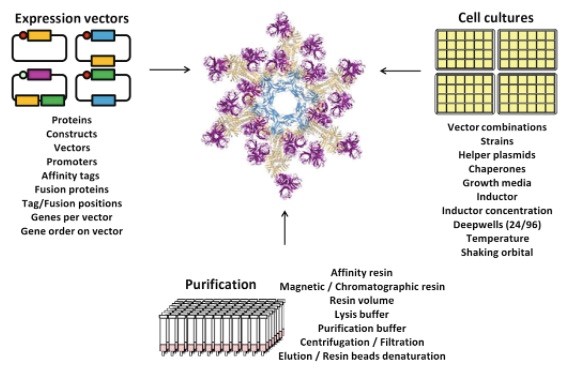Protein Co-Expression Service in E. coli System
Multi-protein complexes are involved in essentially all cellular processes. A protein’s function relies on not only its own physio-chemical properties, but also the interaction status with its partners, and the characteristics of them. Due to the absence of cofactors or post-translational modifications, heterologous protein expression in prokaryote sometimes leads to the yield of insoluble and nonfunctional products. Many protein complexes require co-expression with their native partners in the host cells for proper folding, stability, and activity. Protein co-expression has led to the production of a variety of biological active complexes in sufficient quantities for biochemical, biophysical, structural studies, and high throughput screens.

Profacgen has investigated the use of E. coli co-expression techniques in protein manufacturing, and tried to extend from the common binary expression to the more complicated multi-expression. Results from various case studies have indicated co-expression in E. coli host to be a good alternative compared to endogenous purification or in vitro reconstruction from individually expressed components. It is also proved that co-expression of multiple proteins/complexes a useful alternative to the complicated and expensive expression systems, such as yeast, baculovirus or mammalian cell culture.
- Co-expression of proteins that form a complex
- Co-expression of subunits of a di- or multimeric protein
- Co-expression of protein with chaperones and/or foldases
Different strategies of co-expression services provided by Profacgen:
- Co-expression from one vector: It has the advantage that the primary target and the refolding factor can be carried on a single plasmid.
- Single vector, single RNA transcript
- Single vector, multiple RNA transcripts
- Co-expression from different vectors: To ensure plasmid stability, the vectors should have:
- Different selectable markers, usually antibiotic resistance markers
- Different tags
- Different origins of replication
- Combination of the two above mentioned methods
In addition, Profacgen can also assist the scientists with protein co-expression network analysis, a powerful approach to identify the tissues and the conditions in which important interactions occur. By integrating the co-expression data with a protein interaction network, the scientists will be able to determine the cellular conditions and tissue specificity of protein interaction network of human proteins.
Reference
M. Cristina Vega. Advanced Technologies for Protein Complex Production and Characterization. ISBN: 978-3-319-27214-6. Edition of 2016